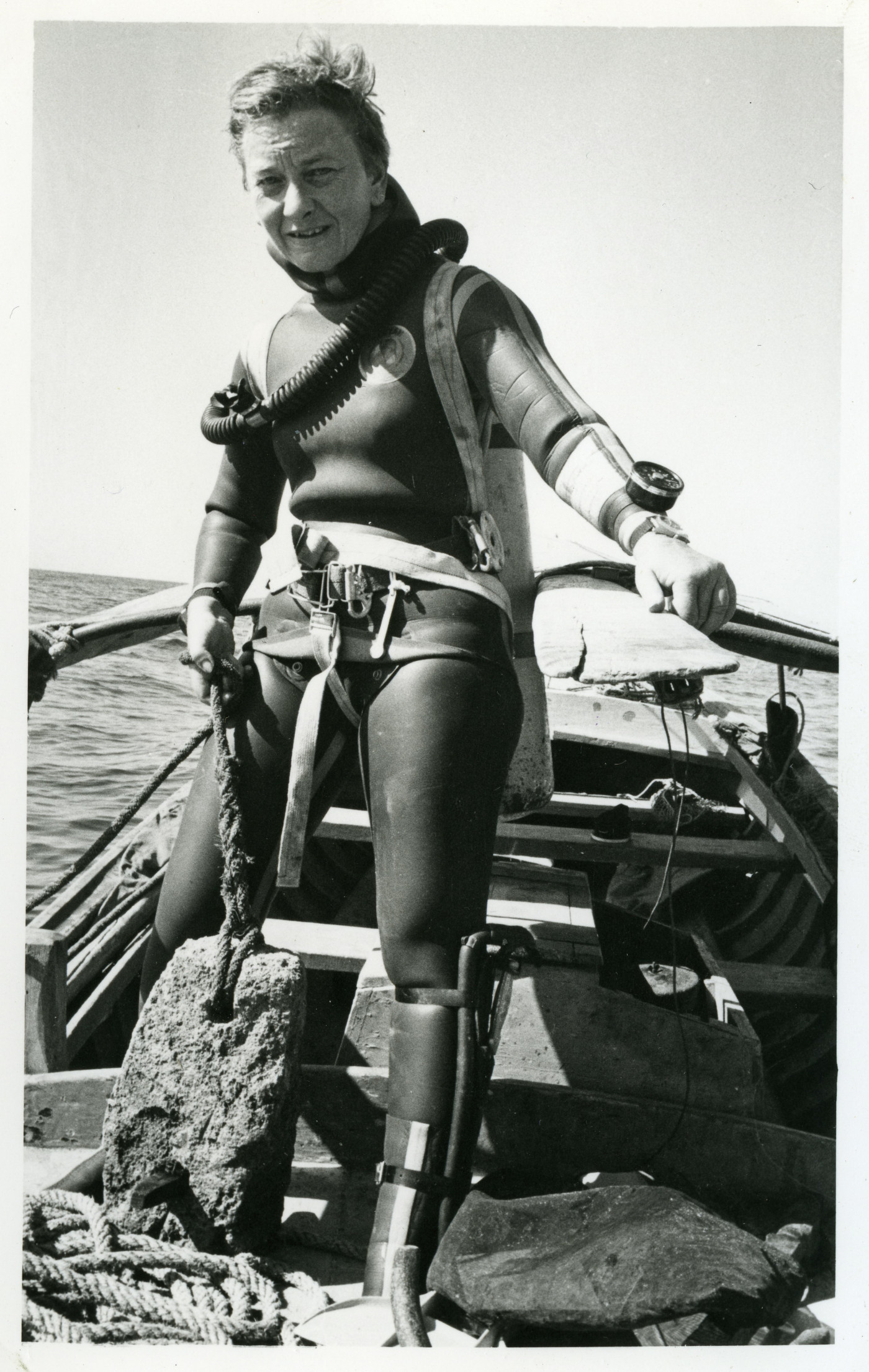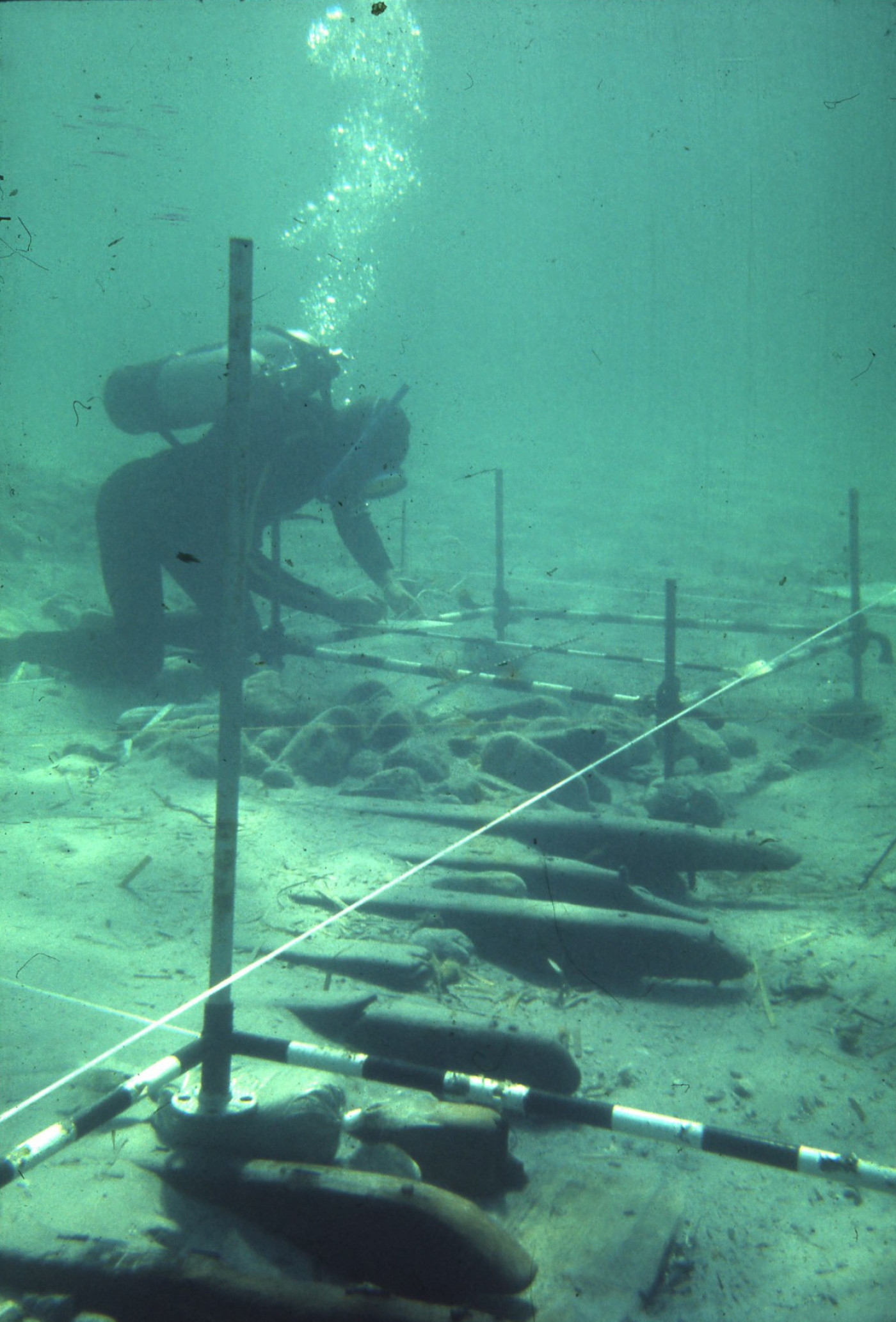This article was written for the Rewriting Women into Maritime inititative by Lauren Tidbury, Maritime Archaeologist, for The Honor Frost Foundation and Maritime Archaeology Trust.
Honor Frost (1917-2010)
Maritime Archaeologist
“There were 6 metres of black water above my head and I sucked air through a mouthpiece, connected by hose to a pump on the surface. Sometimes I forgot and breathed through my nose which meant drawing out the negligible quantity of air in my suit as opposed to the supply to my mouth. A full moon shone on the snow-covered garden, but I was no longer conscious of that world. This first crazy experiment reduced the act of diving to its essentials. My mind was confused neither by exotic surroundings nor the beauties of subaqueous light and landscape, for the baptism took place in a well in Wimbledon”

Honor Frost with Anchor, © Honor Frost Archive, Special Collections, University of Southampton
This was written by Honor Frost after her first experience of diving in the winter of 1952, when she had been invited to try out an experimental diving suit coupled up to a pump in a well in Wimbledon, London. This marked the beginning of a lifelong career in underwater archaeology.
Honor Frost was born in Cyprus in 1917, she grew up with a love for the sea. However, her first career was in the arts as a set designer for the ballet. It wasn’t until the 1950s that her love for the sea became her career. In 1960 she played a fundamental role in what became known as the first systematic underwater excavation, this was on the Late Bronze Age Shipwreck off Cape Gelidonya in Turkey.
Honor Frost was one of the first women to SCUBA (Self-Contained Underwater Breathing Apparatus) dive, she trained at the Club Alpin Sous-Marin in Cannes along with the likes of Jacques Cousteau and Frederic Dumas. She pioneered new techniques in underwater archaeology and stressed that it was possible to undertake excavation underwater to the same standards as on land. However, very little is still known about her beyond the world of maritime archaeology, yet despite facing many hurdles she was relentless in her pursuit in discovering the past.
In the 1950s and 60s Honor spent a lot of time diving off Lebanon and Syria, despite being encumbered with a broken hand after a car crash. She recorded structures underwater from ancient ports and harbours, as well as shipwrecks, and her love of anchors began to grow as she realised the potential of these seemingly simple artefacts to tell us stories about ancient seafaring.
“On the 16th September 1966, I spent five hours being towed along the landward side of the northern reef, stopping to dive on unusual features and landing on the rocky islets. In this way it was possible to get a general impression of the area and, by making traverses, to examine the submerged northern and southern limits of the reef” (Frost)
This was written by Honor after diving off the coast of Tyre in Lebanon. Later in the 1960s, she was asked to survey the Lighthouse site (Pharos) in the Port of Alexandria, Egypt. Then in 1971, she led an international team to record and excavate a Punic shipwreck off the coast of Sicily, which dated to the 3rd Century BC. As well as her excavation and survey work, she was instrumental in establishing the Council for Nautical Archaeology and the International Journal for Nautical Archaeology. Throughout her career, she emphasised the need for an interdisciplinary approach to understanding our maritime heritage and also recognised the importance of publication and dissemination.

Divers working on a Punic Ship Box, c.1972 © Honor Frost Archive, Special Collections, University of Southampton
Honor’s first book was entitled ‘Under the Mediterranean, Travels with my Bottle’. This book recalls her time spent travelling across the eastern Mediterranean, and the many issues she faced, including pretending her dive tank was a baby in order to transport it more easily on buses across Turkey!
Honor continued diving into her late 80s. In fact, she was still using the same diving gear that she used in her early years of diving. When she died in 2010 she left the bulk of her estate to set up a Foundation to support maritime archaeology, particularly in the eastern Mediterranean.
Honor Frost was a truly remarkable and inspirational woman, despite being one of the only and original females in the field and having had no formal academic training, without her the field of maritime archaeology would not be where it is today. Her passion for diving and maritime heritage inspired many other women to take up careers in this field, and her Foundation has facilitated the continuation of training and funding of research into our maritime past.
Honor was regularly quoted as saying that "time spent on the surface was time wasted".
Back to the exhibition home page.

